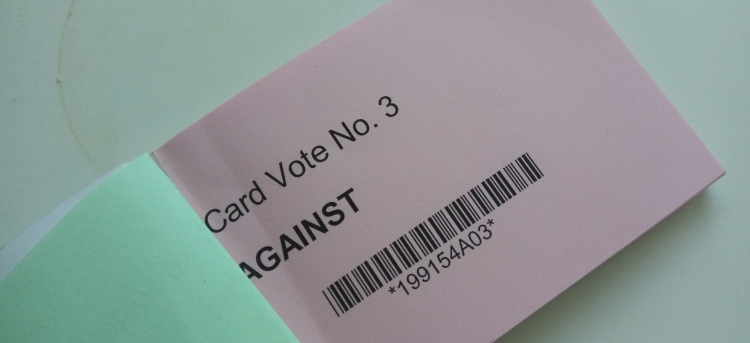Voting at Labour’s conference is by weighted vote, each delegate gets a book of voting slips and some votes are decided by collecting the voting slips and counting them. Each vote is worth the number of members in the affiliate divided by the number of delegates. For instance my card vote this year was worth about 380, about 3800 members, divided by 10 delegates. This is known as the card or block vote. These booklets of votes are not sent by post but must be picked up in person at a “Regional Briefing” starting at 9:00. In previous years this meeting has been used by regional staff to influence new delegates. Two things happened at our briefing; the lack of clarity of the regional staff was not good although they almost made it clear that delegations were dispersed amongst the London block and not sitting together which makes consulting other delegates in the delegation harder than it should be.
More importantly, they had failed to have card votes printed for four of our delegates inc. me and did not have the IT available to make new ones. We were told to go to the balloting office, but the queue was immense and we would have missed the start of conference. (It’s obvious why they distribute the cards in regional briefings as they can have nine queues as opposed to one.) Anyway, I entered the Conference Hall without a card vote book. Since the first item of business is the acceptance of the CAC Report which includes the agenda, timings, the inclusion and exclusion of contemporary & emergency motions and includes any rulings on consequential changes on the agenda. i.e. if the democracy review packages pass, which of the other rule changes fall without debate. This is always controversial and this year the Chair announced that any vote would be taken by show of hands, and if unclear, by hand in parts (i.e. Unions & Affiliates separately from CLPs) and then if it remains unclear a card vote would be taken.

The CAC had proposed that the Democracy Review would be taken on the Sunday, and that the other rule changes taken on the Tuesday; they also recommended that all the rule changes on the subject of Parliamentary Candidate Selection proposed by CLPs would fall if the NEC proposal on the same subject passed. The NEC were proposing a variation of the trigger ballot reform which meant that the two rule changes proposing its abolition, i.e. open selection would fall without debate, or more accurately fall without being moved. It’s hard to predict what would happen, but it was expected that nearly all the Unions (50% of he vote) would vote with the CAC so the question was how many of the CLP would vote against them and here we were, with a bunch of London delegates without their card vote books.
As the card vote was called, I tried to move a point of order to explain some of us could not vote as we didn’t have our card votes; I was told that the chair wasn’t taking a point of order during a vote, I called out that my point of order related to the conduct of the vote but was still told to sit down; on my way back to my seat Len McCluscky asked me what the problem was, and when I explained, said “That’s not right!”. At our seats, those of us without votes made voting slips, but without much hope of them being counted. The Chair then announced that the Ballot Office now had London’s missing card votes and that the ballot boxes would be kept open for another 15 minutes, so we got our votes in.
When the results were announced the CAC Report was approved by 53.63% to 46.37%, with 36,516 (~10%) CLP votes in favour, and 41,004 (~2%) Affiliate votes against. …

